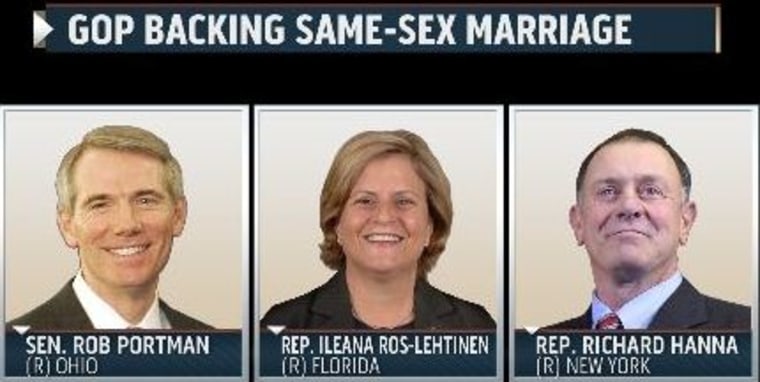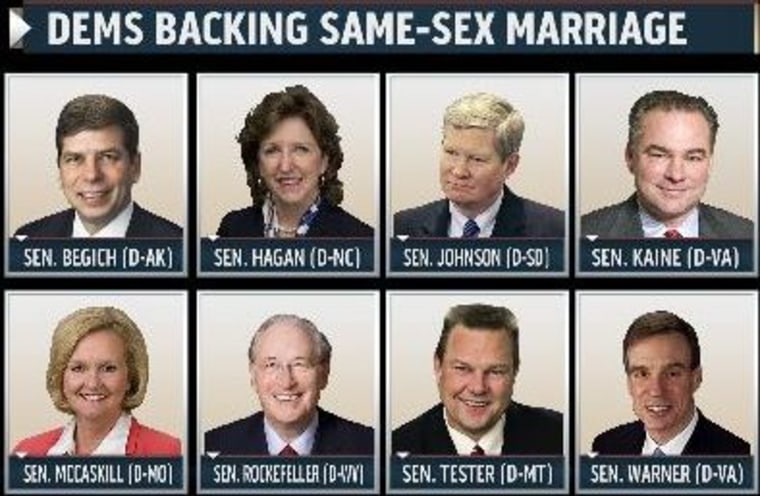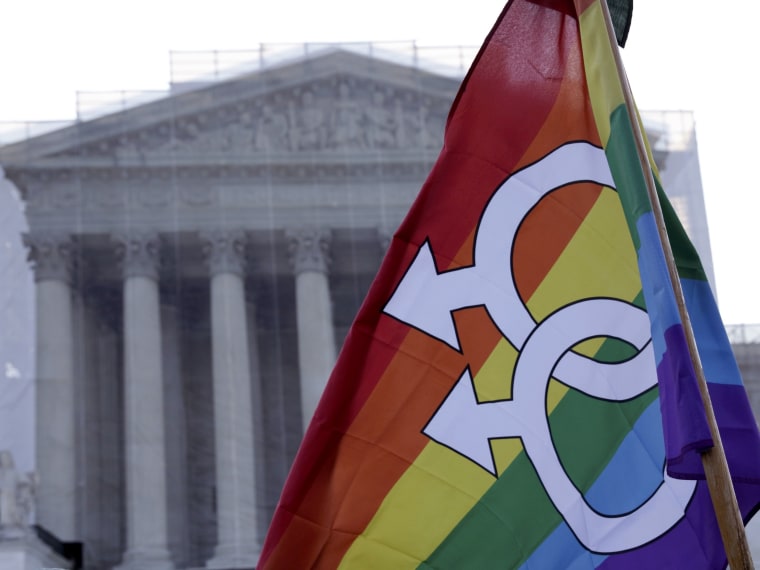As the Supreme Court considers two landmark gay-rights cases this week, politicians on both sides of the aisle are scrambling to position themselves on what they increasingly seem to consider the right side of history, coming out in support of equal rights for gay Americans.
From Bill and Hillary Clinton on the left to Ohio Sen. Rob Portman on the right, no fewer than a dozen influential party leaders have recently revised their positions on gay marriage. As Chief Justice John Roberts said in Wednesday's hearing, a number of politicians “have been falling all over themselves” to vocally support same-sex marriage.
In a telling reflection of the shift in public opinion, a group of more than 100 Republicans including top advisers from the Romney and McCain presidential campaigns signed an amicus brief last month urging the Supreme Court to rule on the side of gay marriage. As Nicolle Wallace, a former strategist for Sen. John McCain's 2008 presidential campaign and amicus brief signatory said on Andrea Mitchell Reports Tuesday, "If you are running for office, and you are trying to court the vote of anyone younger than 40, you oppose marriage equality at your political peril.”
The polling backs up Wallace's claim: Only 30 percent of Americans favored gay marriage in a 2004 NBC News/Wall Street Journal poll, while 62 percent opposed it. Just five years later, support jumped to 41 percent. And a majority backed gay marriage for the first time in December 2012. According to a Washington Post/ABC News poll taken this month, 58 percent of respondents--nearly six in ten--said they supported gay marriage. And among Millennials (18-32 years old), support is at an all-time high at 70 percent.
The accelerated change in public opinion underscores why Republicans and red-state Democrats, even those up for re-election in 2014, are racing each other to get out ahead of the Supreme Court's ultimate ruling on this week's Proposition 8 and Defense of Marriage Act cases, expected in June.
Ohio Senator Rob Portman, once seen as a possible veep candidate with Mitt Romney on the 2012 Republican ticket, reversed his anti-gay-marriage position this month citing influence from his college-aged son, who is gay. The conservative senator had previously voted in favor of DOMA and had also voted to ban gay couples from adopting kids in Washington, D.C.

His fellow Republicans are lending support to an effort to repeal DOMA in Congress, known as the Respect for Marriage Act, which was co-sponsored by Rep. Ileana Ros-Lehtinen (R-Fla.) in September 2011. New York Republican Rep. Richard Hanna, who entered Congress in the 2010 Tea Party wave, signed on to the constitutional amendment in December 2012.

Democratic Senators from deep red states (including Montana's John Tester, Missouri's Claire McCaskill, South Dakota's Tim Johnson, and West Virginia's Jay Rockefeller) have come out in support for gay marriage, along with a number of their colleagues facing re-election in 2014, including Arkansas' Mark Begich and, most recently, North Carolina's Kay Hagan. Both Virginia Senators, Tim Kaine and Mark Warner, are also on the side of gay marriage.
The Republican establishment, meanwhile, is muted: despite spending millions to defend DOMA, Speaker John Boehner and House Republicans have avoided grandstanding on the issue.
If there's one human catalyst for this sweeping change in political platforms, it is former President Bill Clinton, who validated the Defense of Marriage Act restricting federal benefits to one-man, one-woman unions in the midst of a tough re-election fight. Clinton even went so far as to sign the legislation in the dead of night, just before 1 a.m. on Sept. 21, 1996, without cameras or ceremony--perhaps with the memory of the outpouring of opposition to his 1993 Don't Ask, Don't Tell policy on gays serving in the military.
Yet it was Clinton who repudiated the Defense of Marriage Act in a Washington Post op-ed less than three weeks ago, writing, "As the president who signed the act into law, I have come to believe that DOMA is contrary to [the principles of freedom, equality and justice] and, in fact, incompatible with our Constitution.”
Less than two weeks later, former Secretary of State Hillary Clinton released a video on gay-rights group the Human Rights Campaign's web site, saying, "Like so many others, my views have been shaped over time by people I have known and loved, by my experience representing our nation on the world stage, my devotion to law and human rights, and the guiding principles of my faith." Her announcement stoked speculation over a possible 2016 presidential bid.
While political leaders' shift in principle has been derided as opportunistic, Los Angeles Mayor Antonio Villaraigosa, who has publicly supported gay rights since 1994, said on Andrea Mitchell Reports Tuesday, "It doesn't bother me that people are evolving on the issue. We're evolving on a lot of issues over time."
"These are issues that go to the heart of what people believe is right and wrong, and also a reflection of their own values. I'm just excited to see so many people, both Democrat and Republican, realizing that this is a fundamental right--that we shouldn't deny someone the right to marry and to love who they want to love," Villaraigosa said.
